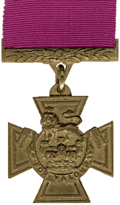Richard Harte Keatinge facts for kids
Quick facts for kids
Richard Keatinge
|
|
|---|---|
 |
|
| Born | 17 June 1825 Dublin, Ireland |
| Died | 25 May 1904 (aged 78) Horsham, Sussex |
| Buried |
Hills Street Cemetery, Horsham
|
| Allegiance | |
| Service/ |
|
| Rank | Lieutenant General |
| Unit |
|
| Battles/wars | Indian Mutiny |
| Awards | |
| Other work | |
Lieutenant General Richard Harte Keatinge (born June 17, 1825 – died May 25, 1904) was an Irish soldier. He received the Victoria Cross. This is the highest award for bravery in the face of the enemy. It is given to soldiers from the United Kingdom and Commonwealth countries.
Contents
Early Life and Military Career
Richard Keatinge was born in Dublin, Ireland. His father was also named Richard Keatinge. He joined the Bombay Army, which was part of the British forces in India. He became an officer in the Bombay Artillery.
Bravery in Battle
During the Indian Mutiny in 1858, Major Keatinge showed amazing bravery. He helped lead an attack on a place called Chundairee. He bravely led his soldiers through a dangerous opening in the wall. This area was under heavy enemy fire.
He was one of the first to enter the fort. He was badly wounded during the attack. His knowledge of a secret path helped save many lives. He had explored this path the night before. Even after being wounded, he continued to lead his men. He was hit again by another serious wound inside the fort.
His bravery and skill were praised by his commanders. They said his actions were key to winning the battle at Chundairee. For this incredible courage, he was awarded the Victoria Cross.
Moving Up in the Army
After his brave actions, Keatinge continued his military career. In 1862, he moved to the Royal Artillery. Later, he joined the Bombay Staff Corps of the British Indian Army. He eventually reached the high rank of Lieutenant General.
Important Roles in India
Richard Keatinge also took on important jobs outside of direct military command.
Designing a College
In 1868, Colonel Keatinge helped design a special school. It was called Rajkumar College, Rajkot. This college was built for the sons of princes and chiefs in India. It officially opened in 1870.
Leading Provinces
From 1871 to 1873, he served as the Chief Commissioner of Ajmer-Merwara. This was an important leadership role in a region of India.
In 1874, he became the first Chief Commissioner of Assam. This was a large province in British India. He held this position until 1878.
Later Life and Legacy
After his many years of service, Richard Keatinge retired. He settled in Horsham, Sussex, England. He passed away there in 1904.
To honor his contributions, a road in Shillong, India, was named Keatinge Road. Shillong was once the capital of Assam, where he served as Chief Commissioner.
 | Stephanie Wilson |
 | Charles Bolden |
 | Ronald McNair |
 | Frederick D. Gregory |

